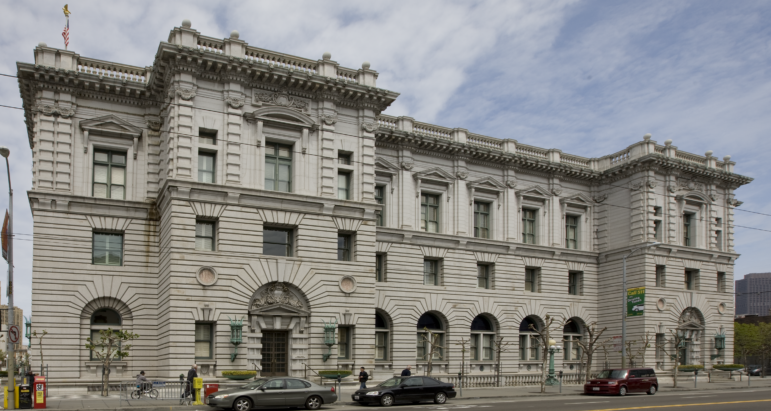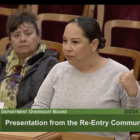An anonymous poster campaign calling out judges who dropped charges against people accused of selling fentanyl is getting strong pushback from San Francisco legal professionals.
“This is just wildly inappropriate,” said Kirk Jenkins, senior counsel at Arnold & Porter Kaye Scholer. “You could cause violence against judges.”
It is unclear when the two colorfully designed posters were pasted to the side of a building on Mission Street near 22nd, or who is behind the campaign. Each depicts a name in large bold red letters, the dates of their arrests, the amount of fentanyl that the designer of poster claims was in their possession at the time of arrest, and the names of judges who released them.
[See also: SF ‘Failing’ on Housing as Overdose Solution, Health Expert Says]
On Friday, Richard Tamor, the attorney for one of the defendants, Nicol Palma, said he had been unaware of the posters. He called them “outrageous.”
“She was released because she’s four months pregnant, and he didn’t want to put her in jail and have a kid in custody,” Tamor said. “To put her name on a poster as a poster child of a judge who — I guess their thinking is he’s lenient — is outrageous. I mean, it’s the most compassionate thing he could have done is let her out. So they really need to get their facts together.”
The Public Press is not naming the other defendant because we were unable to reach them or a representative for comment.
A group called Stop Crime SF has been highly critical of judges and recently announced a campaign to “grade” their performance. The founder, Frank Nota, said in an email that the group was not behind the billboards, “nor do we support them.”
“These posters don’t cut it, because the public does not receive a thorough review of the judge’s record,” Nota said. “Without additional study, one cannot evaluate these judges properly based on such limited information.”
It makes people question the decisions that our judges make, and that in and of itself breeds a suspicion of the law and judicial decisions.
Vidhya Prabhakaran, Bar Association of San Francisco
Another local group called TogetherSF Action launched a similar-looking but less personal campaign in May aimed at shaming city officials over the scourge of fentanyl-related deaths. One of the group’s backers is Michael Moritz, who owns the San Francisco Standard, the newsroom that broke the story about the posters naming and blaming judges for releasing defendants.
TogetherSF’s colorful broadsides pasted on buildings in the Tenderloin carried the motto “That’s Fentalife!” along with sarcastic messages, like a reminder to pick up Narcan, an opioid reversal medicine, on your next shopping trip.
Kanishka Cheng, TogetherSF’s co-founder and executive director, said in media interviews that the campaign was a tongue-in-cheek way to spur city officials into addressing the overdose crisis. Housing and addiction health advocates criticized the posters as insensitive.
In an emailed response to a request for comment, Cheng said TogetherSF was not involved with the poster campaign targeting judges.

Library of Congress
Protesters and politicians last month converged on the Ninth U.S. Circuit Court of Appeals to criticize judges for restricting San Francisco from clearing unhoused people’s belongings. Two weeks later, judges were again public targets, as vigilante graphic designers named two of them, as well as the fentanyl suspects they released pending trial.In a statement, the San Francisco Public Defender’s Office called the tactic “a cowardly act by under-informed people attempting to be legal vigilantes.”
“Public defenders encounter a lot of assumptions and demonization of the people we represent,” the statement said. “We push back against those notions in court and in the news when prompted because they are human beings with complex lives and unique circumstances, especially when it comes to the exploitative drug trade.”
David Faigman, chancellor and dean of the University of California College of the Law, San Francisco, said calling out judges by name risks undermining their crucial role.
“Judges need to be able to articulate how they are exercising leadership to get us to a solution,” Faigman said.
The posters come in the wake of several statements made by prominent elected officials blaming judges for grim street conditions.
“Judges are refusing to make sure that these individuals stay in custody, and that has to change,” District Attorney Brooke Jenkins said on ABC7 on July 12. At an Aug. 3 town hall meeting to discuss safety in the Tenderloin, Jenkins said judges were “ignoring the dangerousness of this conduct.”
On Aug. 23, Mayor London Breed joined a protest outside the federal courthouse to denounce an injunction upheld by the Ninth Circuit U.S. Court of Appeals that banned city officials from clearing the tents and belongings of unhoused people.
In an interview with the San Francisco Chronicle on Aug. 29, Gov. Gavin Newsom criticized judges for interfering with local policies on homelessness.
“Damn it, they need to be accountable as well,” Newsom said. “These judges are wrong on these overriding sweeping orders.”
Bobbie Stein, a San Francisco Pretrial Diversion Project board member and criminal defense attorney, said such comments from public officials are partly responsible for the posters.
“I’m not saying that Brooke Jenkins or London Breed and certainly not Gavin Newsom are telling people to do this kind of thing, but I think it’s fueled by their rhetoric,” Stein said.
She said the “lock them up” narrative “fans the flames of fear” while drawing attention away from research-based solutions for public safety.
“There is growing evidence that increases in incarceration, particularly for drug and other nonviolent crimes, have led to a misallocation of scarce prison resources, and likely undermine families and communities,” Stein said.
The offices of the district attorney, mayor and governor did not respond to requests for comment.
Stein said that although it is not unheard of for campaigns to target judges over perceived lenient sentences, “this is particularly egregious because these aren’t even people that have been convicted of crimes.”
Vidhya Prabhakaran, board chair of the Bar Association of San Francisco, said that since judges are prohibited from commenting on individual cases, the posters were “scapegoating judges who are not in a position to defend themselves.” He added that such actions also undermine the judiciary as a whole.
“It makes people question the decisions that our judges make, and that in and of itself breeds a suspicion of the law and judicial decisions, which is counterproductive to a functioning democracy,” Prabhakaran said.
He said he hopes the campaign backfires and leads people to support and defend the judiciary. “I suspect that’s what will ultimately come out of this.”
Update, Sept. 10: The poster campaign in the Mission quickly morphed into a public art political feud, with some torn off, and others tagged “Jail the Sacklers,” in reference to the family that owns the pharmaceutical company fined billions of dollars for poorly controlled wide distribution of opioids.
Update, Sept. 21: This story was changed to include a response for a request for comment from TogetherSF CEO Kanishka Cheng.










